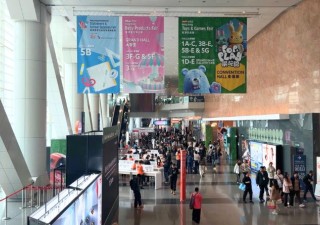1,600 Attend Third Business of IP Asia Forum
11 December 2013

Over 1,600 IP buyers and sellers, research and development professionals, finance and legal intermediaries and design and technology practitioners from 25 countries and regions took part in the Business of IP Asia Forum December 5-6, 2013, at the Hong Kong Convention and Exhibition Centre.
Under the theme IP: Driving the New Economy, the event attracted nearly three times the people attended two years ago.
Hong Kong’s chief executive CY Leung; Hong Kong Trade Development Council (HKTDC) executive director Fred Lam; China State Intellectual Property Office commissioner Tian Lipu and World Intellectual Property Organization deputy director general Wang Binying delivered opening remarks to start the event.
Panel discussions included Rethinking Corporate IP Strategies, featuring Ira Blumberg, vice president of intellectual property at Lenovo; Damon Matteo, chief intellectual property officer at the Palo Alto Research Centre; and Roberto Ribeiro, head of regional patent support at Sanofi Global.
A second general session, IP of the Future, featured speakers including Bernard Meyerson, the vice president of innovation at IBM, and David Llewelyn, professor of IP law at King’s College, London.
A number of breakout sessions were also offered.
In Common Areas of Disputes in Design and Creative Industries in Hong Kong and China. Steven Birt, a partner at Reed Smith Richards Butler in Hong Kong, shared a simple tip for authors to protect themselves: “The cheapest way to evidence a copyright date is to mail some copies to yourself without unsealing the envelope,” he said.
For the many mainland Chinese who attended this session, Anne Choi, a partner at Deacons in Hong Kong, reminded participants that “while Hong Kong is part of China, rights registered here are not necessarily protected in mainland China and vice versa.”
Even rights that are registered in the right jurisdictions can encounter problems. For example, a copyright only covers infringement in two dimensions, but not in 3D, said Peggy Cheung, a council member of the Hong Kong Institute of Trade Mark Practitioners, in Exploitation of IPRs in Business – Technology Transfer and Licensing.
Since people often use the terms IP “commercialization” and “monetization” interchangeably, Kenneth Choy explained the difference in IP Monetization and Intellectual Capital Management. “Monetization is about sale or licensing of patent assets, while commercialization is about practicing of teachings of claims – making money from practicing the IP.”
In Novel Approaches for IP Management in Biotechnology and Traditional Chinese Medicine, Sun Zhaolun, vice president at Beijing East Linden Science and Technology, shared his patent database, wtmpd.com, which is widely used by SIPO officials as it offers specific searches including formula and chemical structure.
Another speaker at this session, Sam Yip, a US patent attorney at Ella Cheong (Hong Kong & Beijing), advised that “start-ups are better off cross-licensing than patenting because large licensors could still ask patent holders with small or weak patent portfolio for huge fees.”
In the last session of the forum, IP in the Cultural/Creative Industries in Hong Kong and the European Union, visiting scholar Emmanuel Gillet said that he preferred an escalation approach from mediation, to arbitration and finally to litigation if necessary because the former two are much cheaper.
However, another speaker, Klaus Heymann, chairman at Naxos Group of Companies in Hong Kong, said that one arbitration actually cost them approximately US$77,400. “Arbitration is definitely not that cheap,” he told Asia IP.






